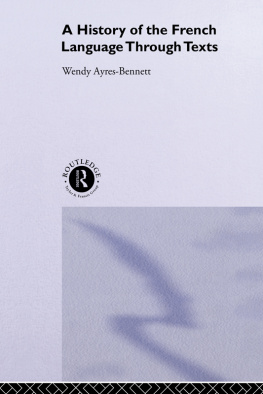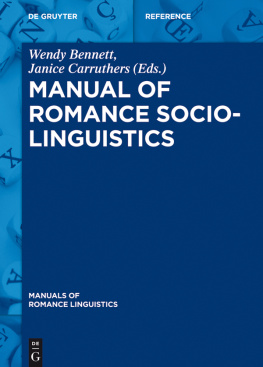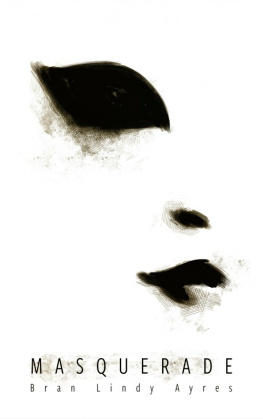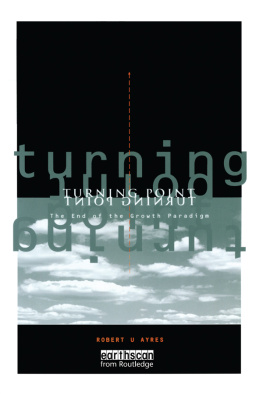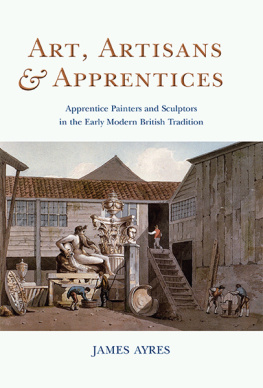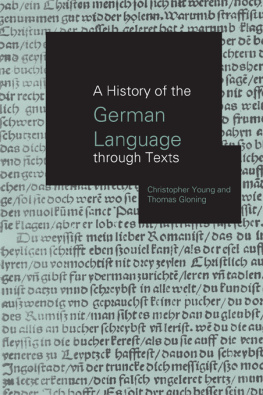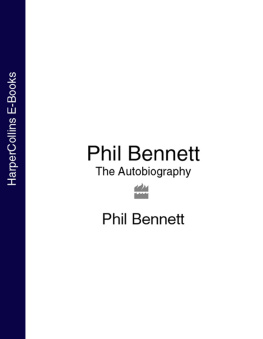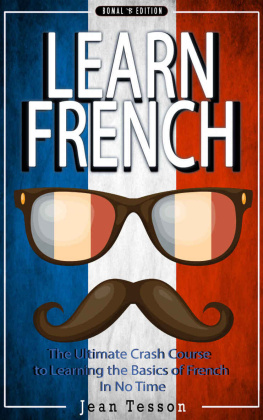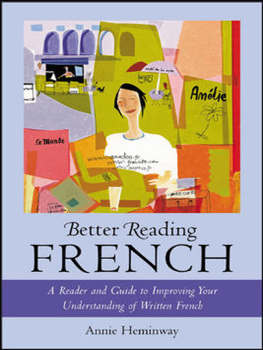Ayres-Bennett Wendy - History of the French Language Through Texts
Here you can read online Ayres-Bennett Wendy - History of the French Language Through Texts full text of the book (entire story) in english for free. Download pdf and epub, get meaning, cover and reviews about this ebook. publisher: Taylor and Francis, genre: Home and family. Description of the work, (preface) as well as reviews are available. Best literature library LitArk.com created for fans of good reading and offers a wide selection of genres:
Romance novel
Science fiction
Adventure
Detective
Science
History
Home and family
Prose
Art
Politics
Computer
Non-fiction
Religion
Business
Children
Humor
Choose a favorite category and find really read worthwhile books. Enjoy immersion in the world of imagination, feel the emotions of the characters or learn something new for yourself, make an fascinating discovery.
- Book:History of the French Language Through Texts
- Author:
- Publisher:Taylor and Francis
- Genre:
- Rating:4 / 5
- Favourites:Add to favourites
- Your mark:
- 80
- 1
- 2
- 3
- 4
- 5
History of the French Language Through Texts: summary, description and annotation
We offer to read an annotation, description, summary or preface (depends on what the author of the book "History of the French Language Through Texts" wrote himself). If you haven't found the necessary information about the book — write in the comments, we will try to find it.
History of the French Language Through Texts — read online for free the complete book (whole text) full work
Below is the text of the book, divided by pages. System saving the place of the last page read, allows you to conveniently read the book "History of the French Language Through Texts" online for free, without having to search again every time where you left off. Put a bookmark, and you can go to the page where you finished reading at any time.
Font size:
Interval:
Bookmark:
A History of the French Language through Texts
Related titles
The French Language Today
Adrian Battye and Marie-Anne Hintze
A History of the French Language
Peter Rickard
Thinking Translation
A course in translation method: French to English
Sndor Hervey and Ian Higgins
A History of the French Language through Texts
Wendy Ayres-Bennett

First published 1996
by Routledge
11 New Fetter Lane, London EC4P 4EE
Simultaneously published in the USA and Canada
by Routledge
29 West 35th Street, New York, NY 10001
1996 Wendy Ayres-Bennett
The publisher has made every effort to trace copyright holders and would be glad to hear from any who have not been traced.
The author asserts the moral right to be identified as the author of this work.
All rights reserved. No part of this book may be reprinted or reproduced or utilized in any form or by any electronic, mechanical, or other means, now known or hereafter invented, including photocopying and recording, or in any information storage or retrieval system, without permission in writing from the publishers.
British Library Cataloguing in Publication Data
A catalogue record for this book is available from the British Library
Library of Congress Cataloguing in Publication Data
A catalogue record for this book has been requested
ISBN 0415099994 (hb)
ISBN 0415100003 (pb)
Symbols
> : becomes
< : comes from
* : placed before a word indicates that the form is unattested; this may be a form posited on the basis of evidence such as comparative data from other Romance languages.
Figures
From P. Rickard, A History of the French Language (London, Unwin Hyman, 1989), p. 40.
From L. Theis, 843: La Premire France, LHistoire, Jan 1987, vol. 96, p. 89.
Bibliothque nationale, lat. 9768, fol. 13r, col. 2.
From A. Tabachovitz, tude sur la langue de la version franaise des Serments de Strasbourg (Uppsala, Almqvist & Wiksells Boktryckeri-A.-B., 1932), p. 1.
From A. Ewert, The Strasbourg Oaths, Transactions of the Philological Society, 1935, pp. 2223.
Glasgow University Library, Hunter 252, fol. 175r.
From R. Olivtan, La Bible. Qui est toute la Saincte escripture. En laquelle sont contenus/ le Vieil Testament & le Nouueau/translatez en Francoys (Neuchtel, P. de Wingle, 1535).
From L. Meigret, Le Trtt de la grammre franoze (Paris, C. Wechel, 1550), fol. 6v
Acknowledgements
Three people Rebecca Posner, Glanville Price and Peter Rickard deserve my heartfelt thanks both for the constant support and encouragement they have offered me over the years and for undertaking the onerous task of reading the complete manuscript of this work and offering detailed comments on it. Others have generously helped with individual commentaries, and especially Clive Sneddon (text 8), Tony Hunt (text 10), Frank Lestringant (text 26), John N. Green (text 36) and Francis Nolan (text 44); mention should also be made of colleagues in the French Department, Cambridge, and in particular, Peter Bayley and Sarah Kay. I would also like to thank Simon Bell and his team at Routledge and the staff at the Cambridge University Library for their practical assistance, and my sons Matthew and Luke Bennett for their tolerance and good humour. Finally, my greatest debt goes to my husband, Andrew Bennett, whose roles in the completion of this project are far too numerous to mention, and to whom this book is dedicated.
Introduction
Texts and Why We Should Study them
What is the point of a history of French through texts? There are, after all, a number of good readable general histories of the language available which make relatively little use of texts or relegate them to an appendix. Peter Rickards A History of the French Language (1974, 21989) provides an excellent introduction in English for students to the subject, and there is also an impressive selection of one-volume surveys in French, including those by Picoche and Marchello-Nizia (1989), Cohen (1947, 41973), or Wartburg (1934, 101971), all of which have their merits. Is not philology, the study of texts, somewhat out of date?
But what if we want to adopt a less passive approach and try to discover for ourselves how the French language has evolved? How can we find out about the history of any language? It is, of course, impossible for us, except in respect of the recent past, to turn to recordings or interrogate native speaker informants about their usage, as would a linguist describing and analysing the contemporary French system. Rather, the historian is dependent on textual material, on written sources, with all the difficulties that we shall see this implies. These texts must provide us with information about the linguistic usage of earlier ages; subsequent comparison of the usage in texts of different periods may then provide clues as to how the language has evolved.
In this volume, therefore, texts are central. Whereas in the past collections of texts have tended to concentrate almost exclusively on the Old and Middle French periods (see, for example, Aspland (1979) or Studer and Waters (1924)), and especially the earliest extant monuments of the French language, here texts dating from the earliest examples in the ninth century up to the late twentieth century have been included, so that the evolution of French up to the present day can be traced. For each period a range of texts is given, including a number of longer core or key texts. The texts are accompanied by detailed linguistic commentaries and not merely notes on difficult or unusual usages or textual variants; this includes detailed descriptions of the sound system (phonology), spelling (orthography), forms or internal structure of words (morphology), construction and word order (syntax), vocabulary (lexis), meanings (semantics) and discourse type of the key texts; briefer, more specific, comments about interesting features of the other texts are given.
The collection thus allows the history of the French language to be viewed both synchronically and diachronically. These concepts are perhaps best understood through Saussures well-known analogy of a chess-board. One can either stop a game of chess at any moment in the game and describe the position and the relationship of the pieces to each other in terms of the structure of the game: such would be a synchronic description. Alternatively one could trace the moves, or history of a particular piece, say a knight, throughout a game: this would give a historical or diachronic description of that piece. In providing synchronic analyses of French at different points in its history, the danger is avoided of viewing Old French, for instance, as merely a stepping stone in the history from Vulgar Latin to Modern French. Thus, from a historical point of view it may be interesting to know that negative pas and the noun le pas (step) derive from the same Latin term, passum. For a synchronic description of Modern French, however, this is less relevant, since for most speakers they are now discrete items.
Texts of Different Discourse Types
Two basic characteristics are shared by most standard, traditional accounts of the history of French. First, as the very name, the history of the French language, implies, traditional surveys have tended to see the language as a monolithic structure and ignore or marginalize variation. Many, for instance, chart the evolution of French in terms of the emergence of a unified standard language, itself characterized by the suppression or elimination of dialectal variation. Typical of this approach is the statement by Picoche and Marchello-Nizia (1989: 3) in the introduction to their history of French: Ce livre a lambition dtre une histoire de ce
Next pageFont size:
Interval:
Bookmark:
Similar books «History of the French Language Through Texts»
Look at similar books to History of the French Language Through Texts. We have selected literature similar in name and meaning in the hope of providing readers with more options to find new, interesting, not yet read works.
Discussion, reviews of the book History of the French Language Through Texts and just readers' own opinions. Leave your comments, write what you think about the work, its meaning or the main characters. Specify what exactly you liked and what you didn't like, and why you think so.

